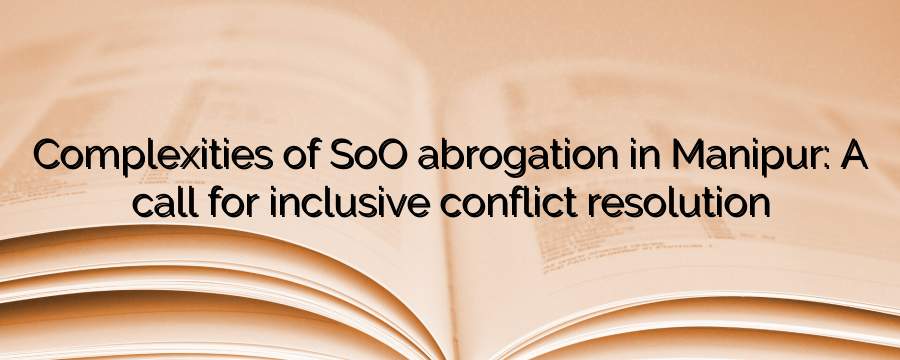In dissecting the clamor for the abrogation of the Suspension of Operation (SoO) with the 25 armed militants affiliated with the UPF and the KNO in Manipur, it becomes evident that the impetus behind the majority community’s demand lies in these groups’ active role in exacerbating the prolonged crisis gripping the state. Over the course of ten months, these militant factions have asserted direct control over civilians residing in areas purportedly dominated by the Kuki-Zo community. Their heavy-handed tactics instill fear and coerce compliance among the populace, effectively subjugating them to their authority. This power dynamic not only perpetuates a sense of instability but also poses a constant threat to the restoration of normalcy in the region.
The recent passage of a resolution by the state assembly advocating for the abrogation of the SoO with the armed Kuki militants was initially hailed as a promising step toward peace-building efforts. However, it swiftly transformed into a point of contention, sparking disagreement between the Kuki and Meitei communities in Manipur. The disparate reactions to the resolution underscore the deep-rooted divisions and intricate socio-political complexities embedded within Manipur’s landscape.
Despite the palpable divisions, there appears to be a prevailing sentiment among the majority in favour of SoO abrogation as a pivotal measure to address the ongoing crisis. Nevertheless, policymakers must tread cautiously and consider the sentiments of all communities, including the 10 Kuki-Zo MLAs, to ensure a comprehensive and inclusive approach to conflict resolution. One potential avenue for this inclusivity could involve a thorough review and amendment of the SoO agreement. For instance, policymakers could contemplate reducing the number of designated camps from the current 14, which are situated perilously close to valley areas and national highways, to just two camps located near the Indo-Myanmar border, far removed from civilian centers.
Moreover, it is imperative to acknowledge the diversity within the Kuki tribe and recognize the integral role that Kuki individuals play in Manipur’s societal fabric. Rather than adopting a blanket approach that vilifies all Kuki individuals as enemies, embracing a more nuanced and inclusive perspective could pave the way for genuine reconciliation and peace-building efforts.
However, the situation is further complicated by the manipulation and coercion of innocent civilians by armed groups, which often leads to their unwitting involvement in conflicts. Addressing the root causes of this manipulation, such as pervasive fear and a lack of viable alternatives, is paramount for fostering sustainable peace and stability in Manipur. Only through a concerted effort to understand and address these underlying issues can meaningful progress toward lasting peace be achieved.
Complexities of SoO abrogation in Manipur: A call for inclusive conflict resolution
174



